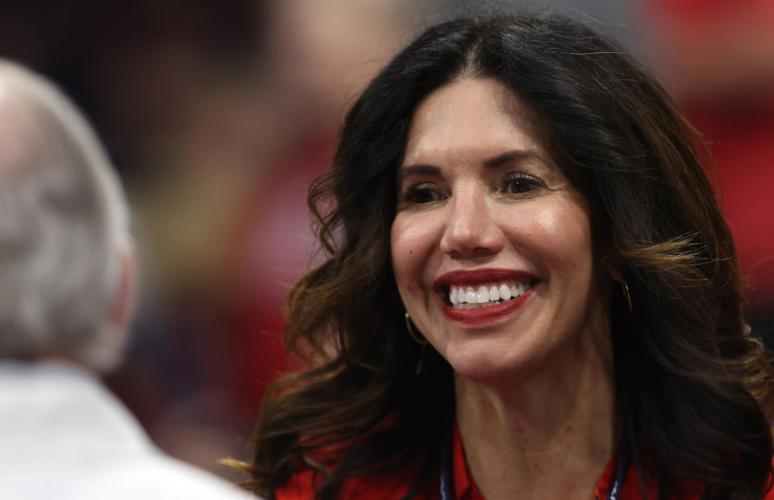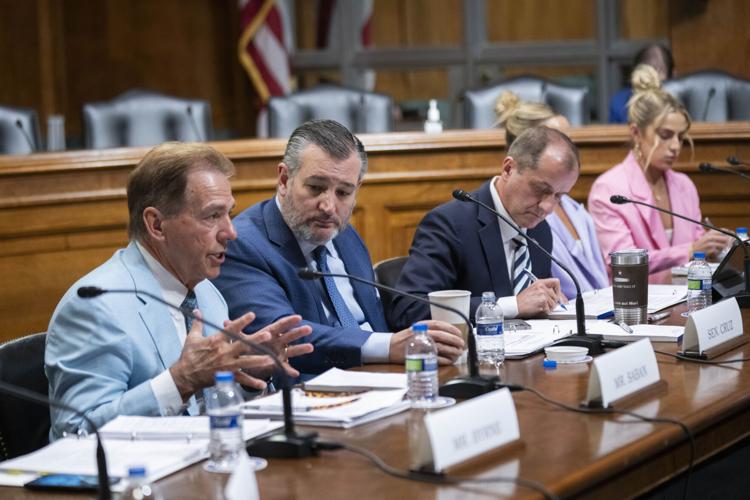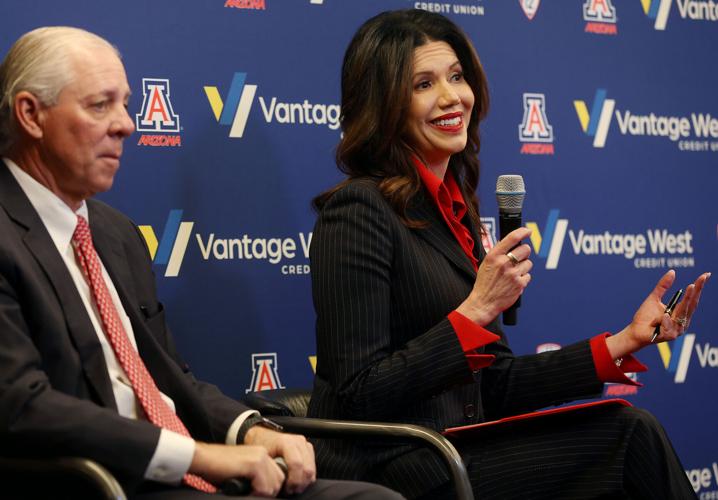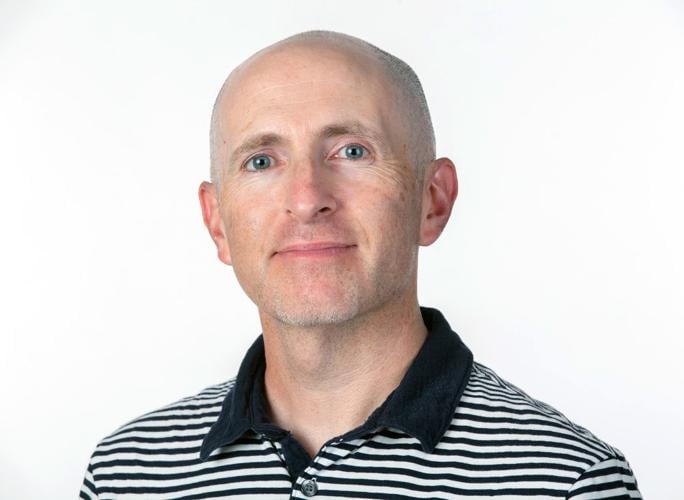Desireé Reed-Francois has a job to do as Arizona’s new athletic director, a position she officially has held for less than two weeks.
She also has a mission that, in her opinion, hasn’t changed in her 20-plus years working in athletic departments — even as everything else in the world of college sports seemingly has.

Michael Lev is a senior writer/columnist for the Arizona Daily Star, Tucson.com and The Wildcaster.
“Yes, I do have to run a business,” Reed-Francois told the Star this week. “But it’s a business with a very important purpose. And that’s providing for our student-athletes.”
Reed-Francois has been spending a good chunk of her time getting to know the Wildcats. She and women’s basketball player Isis Beh reunited; they were previously at UNLV together. Reed-Francois met men’s basketball star and Pac-12 Player of the Year Caleb Love. She met Noah Fifita, quarterback and leader of the UA football team. She came away impressed.

Arizona president Robert Robbins, left, hired Desireé Reed-Francois to do a job as athletic director that at times conflicts with the mission Reed-Francois also is determined to carry out.
“That’s the reason why we do what we do,” Reed-Francois said. “They bring hope, and they inspire you to do great work so you can provide them with every single resource so they can be successful and live their hopes and dreams.”
Connecting with the kids is Reed-Francois’ favorite part of the gig. But it isn’t why UA president Robert C. Robbins brought her back to Tucson.
Robbins sought someone who could help guide the Arizona athletic department through a time of turbulence — including, but not limited to, the “financial crisis” that is plaguing both the department and the university.
As it turns out, the modern-day athletic director’s job and mission are at odds. They might even be in direct conflict. It’s questionable whether they can continue to coexist.
And the consequences if that’s true? Potentially catastrophic.
At a congressional roundtable in Washington, D.C., on Tuesday that featured Nick Saban and his former boss, ex-UA athletic director Greg Byrne, ACC commissioner Jim Phillips painted a grim future for college athletics if student-athletes were to become employees — something that might be inevitable in some form.
Per Yahoo Sports’ Ross Dellenger, Phillips theorized that universities would be able to pay the athletes in the revenue-producing sports: football and men’s basketball. An “equivalent number of female athletes” also would be compensated to satisfy Title IX requirements, Phillips said. Everyone else? Out of luck.
“You can go from 28 to six sports in one fiscal year,” Phillips warned.
Arizona has 22 scholarship sports programs and approximately 500 participants. Football and men’s basketball account for about one-fifth of that total. They’re also the only ones that make money, effectively subsidizing the other 20 — and not well enough to keep the athletic department out of debt.

From left, former Alabama coach Nick Saban, Sen. Ted Cruz (R-Texas), ACC commissioner Jim Phillips, former Miami student-athlete Hanna Cavinder and TCU student-athlete Haley Cavinder speak during a roundtable on the future of college athletics and the need to codify NIL on Tuesday, March 12, 2024, in Washington.
Reed-Francois insists cutting sports programs isn’t under consideration to help the UA get out of the red. Would the equation change if the school had to pay every player, regardless of their revenue-producing prowess, an hourly wage? How could it not?
Saban promoted a concept that could prevent college sports from morphing into something unrecognizable: revenue-sharing. That would give the players a slice of the pie — billions of dollars in media rights — that most reasonable people believe they deserve. It also would approach the line of employment — which seems antithetical to the mission for the vast majority of student-athletes — without crossing it.
Additionally, it would ease the burden on NIL donors, who currently are providing the bulk of the compensation — while also footing the bill for season tickets, facility upgrades and who knows what else.
Contrary to what you might have heard, NIL isn’t killing college sports. As Reed-Francois noted, the ratings for the College Football Playoff were robust. March Madness is as popular as ever. Early entrants into the NFL Draft are actually declining because borderline pros can make more money by staying in school. That’s a positive for college football.
The consolidation of schools, influence and power — fueled by football — is the real worry. I’ve been among those to suggest that making football its own entity, while simultaneously resetting the other sports to their traditional conference affiliations, would solve the realignment issue. These bloated, geographically illogical leagues aren’t good for college sports — especially those who play them.

New Arizona athletic director Desireé Reed-Francois talks with UA president Robert Robbins just before Arizona tipped off against UCLA in the Wildcats’ final regular-season Pac-12 women’s basketball game on March 2 at McKale Center.
But would the people running the College Football Super League still be willing to subsidize the other sports? And if not, could they survive?
“If you were to split out football, what does that do with the rest of our other 21 sports? I don’t think that’s the answer,” Reed-Francois said. “Also … if you went and asked those student-athletes, do they want to be excluded from the rest of the athletic department?”
She has a point. I’m not sure they want to be employees either. Most college students don’t also have full-time jobs. It’s the last time in their lives in which they don’t have to deal with the real world. Why add that weight?
Reed-Francois labeled this period for young people “one of the most special times in their lives.” She also acknowledged the “many challenges” she and her colleagues face. She wouldn’t call them “problems” — at one point correcting herself mid-word.
“Every other day,” Reed-Francois said, “there’s a new lawsuit.”
That might be an understatement.
“But in the end,” she continued, “this is about 18- to 22-year-olds. And this is about providing them with a championship experience. Those memories that they’re going to have are going to last them a lifetime. …
“Yes, there are challenges. But there’s always going to be challenges.”
Where others see despair, Reed-Francois finds hope. She also brings perspective.
Last week, Reed-Francois visited her brother, Roman Reed, who was paralyzed while playing football 30 years ago.
“He’s bedridden,” Reed-Francois said. “Those are real challenges.
“We’re gonna figure things out.”
That’s the job.
Regarding the other part, Reed-Francois said she has administered hundreds of exit surveys to graduates at her previous stops. She always asks why they chose the university they attended.
“I have never had one say, ‘I chose it because of the facilities. I chose it because of the gear,’ ” Reed-Francois said. “They always talk about how they were made to feel.”
Mission accomplished.







